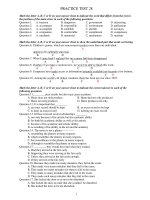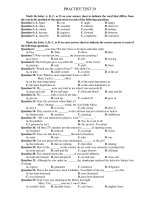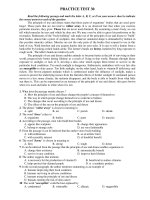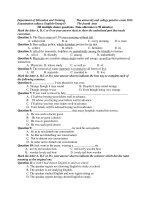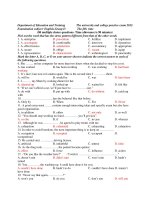Tài liệu Đề Thi Thử Đại Học Khối A1, D Anh Văn 2013 - Phần 5 - Đề 27 pptx
Bạn đang xem bản rút gọn của tài liệu. Xem và tải ngay bản đầy đủ của tài liệu tại đây (42.71 KB, 6 trang )
PRACTICE TEST 30
Read the following passage and mark the letter A, B, C, or D on your answer sheet to indicate
the correct answer to each of the question
The principle of use and disuse states that those parts of organisms’ bodies that are used grow
larger. Those parts that are not tend to wither away. It is an observed fact that when you exercise
particular muscles, they grow. Those that are never used diminish. By examining a man's body, we can
tell which muscles he uses and which he does not. We may even be able to guess his profession or his
recreation. Enthusiasts of the "body building" cult make use of the principle of use and disuse to "build"
their bodies, almost like a piece of sculpture, into whatever unnatural shape is demanded by fashion in
this peculiar minority culture. Muscles are not the only parts of the bodies that respond to use in this
kind of way. Walk barefoot and you acquire harder skin on your soles. It is easy to tell a farmer from a
bank teller by looking at their hands alone. The farmer's hands are horny, hardened by long exposure to
rough work. The teller's hands are relatively soft.
The principle of use and disuse enables animals to become better at the job of surviving in their
world, progressively better during lifetime as a result of living in that world. Humans through direct
exposure to sunlight, or lack of it, develop a skin color which equips them better to survive in the
particular local conditions. Too much sunlight is dangerous. Enthusiastic sunbathers with very fair skin
are susceptible to skin cancer. Too little sunlight, on the other hand, leads to vitamin-D deficiency and
rickets. The brown pigment melanin which is synthesized under the influence of sunlight, makes a
screen to protect the underlying tissues from the harmful effects of further sunlight. If suntanned person
moves to a less sunny climate, the melanin disappears, and the body is able to benefit from what little
sun there is. This can be represented as an instance of the principle of use and disuse: skin goes brown
when it is used and fades to white when it is not.
1. What does the passage mainly discuss ?
A. How the principle of use and disuse change the people's concept of themselves
B. The way in which people change themselves to conform to fashion
C. The changes that occur according to the principle of use and disuse
D. The effect of the sun on the principle of use and disuse
2. The phrase "wither away" is closest in meaning to
A. split B. rot C. perish D. shrink
3. The word "those" refers to
A. organisms B. bodies C. parts D. muscles
4. According to the passage, men who build their bodies
A. appear like sculpture B. change their appearance
C. belong to strange cults D. are very fashionable
5. From the passage it can be inferred that the author views body building
A. with enthusiasm B. as an artistic form
C. with scientific interest D. of doubtful benefit
6. The word "horny" is closest in meaning to
A. firm B. strong C. tough D. dense
7. It can be inferred from the passage that the principle of use and disuse enables organisms to
A. change their existence B. automatically benefit
C. survive in any condition D. improve their lifetime
8. The author suggests that melanin
A. is necessary for the production of vitamin D B. beneficial in sunless climates
C. helps protect fair-skinned people D. is a synthetic product
9. In the second paragraph, the author mentions suntanning as an example of
A. humans improving their local condition
B. humans surviving in adverse conditions
C. humans using the principle of use and disuse
D. humans running the risk of skin cancer
10. The word "susceptible" could be best replaced by
A. condemned B. vulnerable C. allergic D. suggestible
Read the following passage and mark the letter A, B, C, or D on your answer sheet to indicate the
correct answer to each of the question
Pottery is the name given to all kinds of pots and utensils made from clay and other minerals when
they have been "fired", that is hardened by heat in the potter's kiln. Articles made of pottery includes
plates, cups, and saucers cooking dishes, wall and floor tiles, chemical storage jars, bathroom fittings,
filters, drain pipes, electrical insulators and ornaments for the home.
Pottery is one of the oldest crafts, which began to be practised as soon as man learned to control fires,
and long before the melting of metals. It enabled him from very early times to make vessels for storing
and cooking food, for carrying water, and for ritual burial purposes. Early vessels were shaped by hand
and probably "fired" in a big bonfire by covering them over with dried grass and dead branches, which
were then set alight.
A great advance in pottery followed the invention of the potter's wheel and the kiln. It is not
certainly known where the potter's wheel was first used, but it is thought that by about 3500 B.C. potters
in Central Asia were using some kind of wheel. From there its use spread west and east to Egypt, Crete,
China- and then to Ancient Greece and Rome.
At first the wheel was nothing more than a small disc, turned on a pivot by hand, but later it was
improved by raising it and providing it with larger circular platform near the ground as well which could
be rotated by the potter with his feet. Such a wheel was probably in use in Egypt by about 200 B.C.,
though this is only conjecture; but it was certainly in use in Europe at the beginning of the nineteenth
century. In the eighteenth century, however the potter's wheel was improved so that it could be worked
by a treadle, or turned by an assistant. Modern potter's wheels are power driven.
There are three principle ways articles may be made of pottery. They may be simply shaped by
hand. They may be thrown on the potter's wheel and shaped against the spin with the finger or some
scraping tool. Thirdly, the wet clay may be put in a pre-shaped "form" of plaster - of - Paris.
After the post have been made, they are slowly baked in the kiln. This produces chemical changes
in the clay which have a hardening effect. The time taken for firing pottery varies with the size of the
kiln and the type of clay. It can take anything from 24 hours to as long as 2 weeks.
11. The early making of pottery
A. pre-dated the discovery of fire
B. post-dated the melting of metals
C. was dependent on the control of fire
D. avoided the need for storing and treating food
12. Before the invention of the potter's wheel
A. pottery vessels are shaped by hand
B. it was impossible to make pottery vessels
C. pottery vessels were shaped by heating in a bonfire
D. pottery could only be obtained from Central Asia
13. The first potter's wheel was invented
A. in Central Asia B. in Egypt
C. in Ancient Greece D. probably before 3500 B.B.
14. The ancient Greeks and Romans
A. did not use the potter's wheel
B. learned about the potter's wheel from elsewhere
C. did not make pottery
D. carried the potter's wheel to Egypt, Crete, and China
15. Improvements to the potter's wheel
A. came only in the twentieth century
B. have never really been successful
C. have been concerned with motive power methods mainly
D. ceased after 200B.C
16. A foot-operated potter's wheel was in use in Egypt
A. certainly by 200B.C
B. probably by the beginning of the nineteenth century
C. for a short period in the second century A.D.
D. perhaps around 200 B.C.
17. The three ways articles can be made of pottery are
A. spinning, moulding and "throwing"
B. "throwing", hand shaping and on a wheel
C. hand shaping, "throwing" on a wheel, and moulding in a "form"
D. are becoming increasingly sophisticated
18. The word "bonfire" is closest in meaning to
A. oven B. kiln C. outdoor fire D. kitchen fire
19. The word "firing" could be best replaced by
A. shooting B. baking C. burning D. covering
20. The word "spin" is nearest in meaning to
A. turn quickly B. direction of turning C. revolve D. hand tool
Mark the letter A, B, C, or D on your answer sheet to indicate the correct answer to each of the
following questions.
21. It sounds incredible; it's true
A. yet B. though C. although D. because
22. He just can't without cigarettes
A. make B. do C. pass D. go
23. that the door is locked, will you?
A. look B. watch C. see D. understand
24. Our last hopes would all probability evaporate
A. on B. in C. of D. for
25. A motorbike knocked Ted down'. - ' '
A. What is it now? B. What a motorbike! C. How terrific! D. Poor Ted!
26. The workers voted in favour of a (n) strike
A. interminable B. endless C. ceaseless D. indefinite
27. Not until home that he had taken someone else's bike.
A. did he get/ he realised B. he got/ did he realise
C. he got/ he realised D. he got/ he did realised
28. Our Import- Export Company Limited will have to sales during the coming year.
A. expand B. enlarge C. extend D. increase
29. One condition of this job is that you must be to work at weekends.
A. acceptable B. available C. accessible D. capable
30. Ken his doctor's advice and continued to overwork.
A. disregarded B.disassociated C. disowned D.disappointed
31 You the washing up. I could have done it for you.
A. hadn't to do B. needn't have done
C. couldn't have done D. mustn't have done
32. Katy wanted to everything that had happened at the party.
A. recount B. claim C. talk D. say
33. In order to avoid boredom, the most important thing is to keep oneself .
A. occupation B. occupied C. occupant D. occupational
34. When Sarah walked into the room and greeted everyone with a cheery " hello", it seemed as if all the
gloom in that place was driven out.
A. expelled B. ejected C. vanished D. removed
35. We don't allow in the classroom.
A. people smoke B. smoke C. people to smoke D. to smoking
36. It is vital that we a change in people's attitude.
A. bring down B. bring back C. bring about D. bring away
37. "Which is more important, luck or effort?" -" Luck is effort"
A. of the same importance B. the same importance as
C. of the same importance as D. as the same importance as
38. the students here are serious about studying.
A. Most B. Almost C. Almost of D. Most of
39. Potential dehydration is ………………… that a land animal faces.
A. the often greatest hazard B. the greatest often hazard
C. often the greatest hazard D. often the hazard greatest
40.Study harder ………………….
A. if you will pass the exam B. and you pass the exam
C. unless you pass the exam D. or you won’t pass the exam
41. The newspaper is owned by the Mearson Group, …………… chairman is Sir James Bex.
A. which B. that C. whom D. whose
42. Sound comes in waves, and the higher the frequency,…………
A. higher is the pitch B. the pitch is higher
C. the higher the pitch D. pitch is higher
43. Fire safety in family houses, most fire deaths occur, is difficult.
A. where B. why C. how D. when
44. UNESCO hopes to encourage universal respect for justice, laws, human ……………, and
fundamental freedoms.
A. rights B. projects C. programs D. protests
45. Beaches were as police searched for canisters of toxic waste from the damaged ship
A. sealed off B. cut off C. washed up D. kept out
46. You will not succeed ……………… working harder.
A. unless B. if C. without D. although
47. A: “ Do you mind if I use your bike?” - B: " ………………………"
A. Yes you do B. Yes , it’s my pleasure
C. No, you don’t D. No, You can use it
48. of the financial crisis, all they could do was hold on and hope that things would improve.
A. At the bottom B. at the height C. On the top D. In the end
49. The fact that trade links were well-developed at this time some plausibility to his opinion.
A. provides B. supplies C. lends D. offers
50. When I got my case back, it had been damaged repair.
A. above B. beyond C. over D. further
Mark the letter A, B, C, or D on your answer sheet to indicate the word that differs from the rest in
the position of the main stress in each of the following questions.
51. A. technological B. punctuality C. representative D. characteristic
52. A. secure B. vacant C. oblige D. equip
53. A. satisfaction B. effectiveness C. accountancy D. appropriate
54. A. fertilize B. implement C. prevention D. enterprise
55. A. accompany B. interview C. dynamism D. comfortable
Mark the letter A, B, C, or D on your answer sheet to indicate the sentence that is closest in meaning
to each of the following questions
56. She stopped asking for advice on how to lose weight.
A. She stopped to ask for advice on how to lose weight.
B. She stopped and asked for advice on how to lose weight.
C. She gave up asking for advice on how to lose weight.
D. She stopped because she wanted advice on how to lose weight.
57. I remember telling you about the due day of the exam paper.
A.I remember to tell you when the exam paper was due.
B.I think I have told you about the exam paper's due.
C.I think I have told you when you sit for the exam.
D.I remember I have told you when the exam paper is due.
58. Friendly though he may seem, he’s not to be trusted.
A. However he seems friendly, he’s not to be trusted.
B. However friendly he seems, he’s not to be trusted.
C. He may have friends, but he’s not to be trusted.
D. He’s too friendly to be trusted.
59. Alfred said to John, “I didn’t use your cassette player! Someone else did, not me.”
A. Alfred told John that he hadn’t used his cassette player, saying that someone else had.
B. Alfred denied having used John’s cassette player, saying that someone else had.
C. Alfred refused to use John’s cassette player, saying that someone else had.
D. Alfred said to John that he hadn’t used his cassette player, saying that someone else had.
60 . I only called the police as a last resort.
A. I only called the police when it was special.
B. I only called the police at last.
C. I only called the police when I had tried everything else.
D. I only called the police at the last moment.
61. rain / every day / have / spend / most / time /indoors
A. It is raining every day so we had to spend most of time indoors.
B. It rained nearly every day so we had spent most of our time in doors.
C. It rained every day so we have spent most of time indoors.
D. It rained every day so we had to spend most of our time indoors.
62. he / catch / red-handed / he / no choice / confess
A. He caught red-handed so he had no choice but to confess.
B. He was caught red-handed so he had no choice but confess.
C. He was caught red-handed so he had no choice but to confess.
D. He was caught red-handed so he had no choice but confessing.
63. no point / join / club / full / eccentrics
A. There is no point in joining that club because it seems to be full of eccentrics.
B. It is no point in joining that club because it seems to be full of eccentrics.
C. There is no point to join that club because it seems to be full of eccentrics.
D. It is no point to join that club because it seems to be full of eccentrics.
64. When / everyone / seat / lawyer / speak.
A. When everyone was seated, the lawyer spoke.
B. When everyone seated, the lawyer spoke.
C. When everyone was seated, lawyer spoke.
D. When everyone seated, lawyer spoke.
65. Our plan/ might/ cancel/ due/ lack of funds.
A. Our plan might be canceled due to lack of funds.
B. Our plan might canceled due to lack of funds.
C. Our plan might cancel due to lack of funds.
D. Our plan might be cancel due to lack of funds.
Mark the letter A, B, C, or D on your answer sheet to show the underlined part that needs correction.
66. Birds and bats can hear the sounds by insects and distinguish between desirable
A
and undesirable species by the number of wing beats per second that each makes itself.
B C D
67. The most great trumpet player, Louis Armstrong, went from New Orleans to
A
in 1922 to join a band that helped spread jazz through phonograph recordings.
B C D
68. The 1980 saw the birth of the bicycle crazy in the United States.
A B C D
69. Cancer cells are often moved from original sites to other part of the body
A B C
by the blood and lymph.
D
70. The chance of lightning striking a building depends on its height.
A B C D
Read the following passage and mark the letter A, B, C, or D on your answer sheet to indicate the
correct word for each of the blanks
Rock carvings suggest that Stone Age people were hunting whales for food as early as 2200 B.C.
Such ( 71) hunting is still practised today in a number of (72) including the Inuit
people of Greenland and North America.
Whaling became big (73) from the seventeenth century as the (74) for whale bone
and whale oil rose, and humpback and sperm whales were hunted in increasingly large numbers.
(75) just as stocks of these species began to fall, the explosive harpoon gun was (76 )
This weapon , together with the development of steam-powered ships, enabled the whalers to hunt
the fast-moving fin and blue whales.
In 1905 the whaling (77) moved to the waters of Antarctica. The introduction of massive
factory ships enabled the whales to be processed at sea. As a result the blue whale had (78)
disappeared by the 1950s. in 1946 the International Whaling Commission was established to
maintained the declining whale populations. Quotas were set but (79) were often ignored and
the numbers continued to fall. Hunting of many species continued until 1986 when the IWC finally
responded to international (80) and a ban on commercial whaling was introduced
71. A. survival B. essential C. basic D. subsistence
72. A. groups B. societies C. races D. nationalities
73. A. business B. commerce C. trade D. finance
74. A. demand B. desire C. request D. reliance
75. A. though B. because C. but D. therefore
76. A. invented B. discovered C. assembled D. applied
77. A. lines B. troops C. staff D. fleets
78. A. virtually B. possibly C. ununique D. commonly
79. A. things B. these C. those D. there
80. A. reputation B. volume C. shame D. pressure


